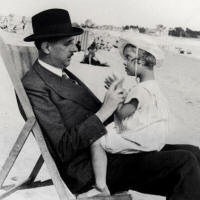Catholic Medical Quarterly Volume 72 (3) August 2022
General Charles De Gaulle and a very special person with Down’s Syndrome
 Anne
de Gaulle was the youngest daughter of General Charles de Gaulle. She was
born in 1928 in Trier, Germany, where her father was stationed with the
Army of Occupation in the Rhineland. De Gaulle’s wife Yvonnne was struck
by a car shortly before Anne’s birth. The doctors said that she was
retarded and that she would probably never be able to speak. We hear in a
biography of Richard Nixon [1] that “the de Gaulles were devastated."
Madame De Gaulle wrote to a friend, “Charles and I would give any- thing,
health, all our money, advancement, career if only Anne could be an
ordinary little girl like the rest”. When someone suggested that they put
her in a home, De Gaulle refused. “She did not ask to come into the world”
he said, “We should do everything to make her happy”.
Anne
de Gaulle was the youngest daughter of General Charles de Gaulle. She was
born in 1928 in Trier, Germany, where her father was stationed with the
Army of Occupation in the Rhineland. De Gaulle’s wife Yvonnne was struck
by a car shortly before Anne’s birth. The doctors said that she was
retarded and that she would probably never be able to speak. We hear in a
biography of Richard Nixon [1] that “the de Gaulles were devastated."
Madame De Gaulle wrote to a friend, “Charles and I would give any- thing,
health, all our money, advancement, career if only Anne could be an
ordinary little girl like the rest”. When someone suggested that they put
her in a home, De Gaulle refused. “She did not ask to come into the world”
he said, “We should do everything to make her happy”.
Anne was born with Down’s Syndrome [2] and in a time where disabled children were routinely sent to institutions, she lived with her family until her death. There was one sacred rule in the de Gaulle household: Anne was never to be made to feel different or less than anyone else. Charles de Gaulle was a quiet man, noted for his reserve and even with family members. He was usually not very demonstrative. His grandson once said on Radio 4 that his father would never be seen in the morning until he was fully dressed in military uniform.
But with his daughter Anne this all changed. She generated in him a warmth that he had seemed to be storing for his entire life just for her. He would dance little jigs for with her, do pantomimes, sing popular songs to her. During her brief life, he was the only person who could make her laugh.
One of de Gaulle’s neighbours recalled how he used to walk with her hand-in-hand around the property, caressing her and talking quietly about the things she understood. She was, he said simply, "My joy. She helped me overcome the failures in all men, and to look beyond them”.
The de Gaulles fiercely protected Anne from the press and others. Her father forbade photographers from including any of his children in publicity shots taken at him home during the war years. He knew that the presence or absence of Anne would be sure to elicit comment. Other children teased her because she was different. But her pain was compounded because she did not know why she was different.
In 1948, Anne died of pneumonia, a month after her 20th birthday and died in her father's arms. At the conclusion of the brief graveside service, de Gaulle took his wife’s hand and said “Come, now she is like the others."
On 22 August 1962, Charles de Gaulle was the victim of an attempted assassination at Petit-Clamart. He later said that the potentially fatal bullet had been stopped by the frame of the photograph of Anne that he always carried with him, placed this particular day on the rear shelf of his car. When he died in 1970, he was buried in the cemetery of Colombey-les-Deux-Églises beside his beloved daughter.
Anne could only say one word clearly in her entire life: 'Papa'
